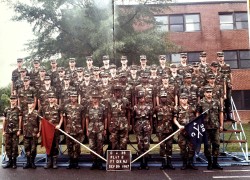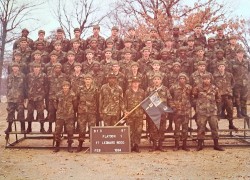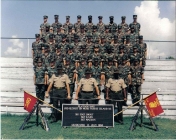Specialty Summary. Operates, deploys, and sustains radio transmitters, receivers, and ancillary equipment for line-of-sight, air-to-ground, and satellite communications (SATCOM). Provides multiple spectrum (HF, VHF, UHF, SHF, EHF) communications in fixed and tactical environments. Configures antenna and radio equipment for efficient operations. Establishes and maintains secure and non-secure communications links with distant stations. Operates terminal control consoles and monitors system performance indicators. Implements operational directives. Manages communications facilities and activities to include: Satellite Communications, Tactical Operations, Combat Crew Communications (CCC) and Air/Ground communications.
Duties and Responsibilities:
Operates and supervises operations of radio systems, computer interfaces, secure voice encryption equipment; data link equipment; radio relay equipment; recording equipment; and communications equipment. Tunes transmitters, receivers, or transceivers to required signals on prescribed operating frequencies. Erects and orientates antenna systems. Maintains authentication systems, codes, communications directives and publications, and radio frequency propagation data. Analyzes propagation data to determine frequency selection. Uses countermeasures to neutralize effects of communications jamming. Analyzes and monitors equipment operation. Conducts equipment troubleshooting and performs limited preventive maintenance, scheduled equipment checks, and identifies malfunctions. Controls and accounts for Communications Security (COMSEC) materials, classified and controlled documents, and equipment.
Performs fixed Air/Ground operations: Receives, processes, and relays operational, and administrative communications traffic from air and ground stations supporting deployed forces, aircraft safety, command and control. Encodes and decodes classified messages. Complies with local instructions and international agreements upon receiving emergency or distress signals. Tracks and files all message traffic and station logs. Compiles and maintains operation records and statistics. Reports equipment statistics and operating efficiency.
Tactical Communications. Performs tactical communications duties. Plans, installs, and operates SATCOM, HF/VHF/UHF systems in support of aeromedical evacuations and special operations missions.
CCC trains and equips bomber, tanker, early warning, and reconnaissance and airlift crews with communications information. Provides air crews with COMSEC user training, flight information publications, identify-friend-or-foe/selective identification features codes, authentication, encode and decode systems, crypto keying material and call signs. Constructs combat mission folders, communications kits and tactical communications plans. Programs, issues, and trains users on specialized communications equipment. Researches and extracts information for safety or flight, to include communications settings, and crypto requirements from various operational orders, special instructions, and air tasking orders. Deploys in support of aircrews.
Manages radio communication systems operations. Reviews and evaluates radio operations activities and takes corrective actions to eliminate discrepancies and improve operational efficiency. Documents discrepancy reports and manages corrective actions. Conducts periodic inspections of equipment and facilities to ensure compliance with directives and mission requirements.
Specialty Qualifications:
Knowledge. Knowledge is mandatory of: functions and operations of fixed and tactical radio and satellite transmitters, receivers, transceivers, remote control units, control consoles, phone patch, and terminal equipment; basic theory and type of fixed and tactical antennas; operation of cryptographic equipment; worldwide communications systems; radio operations procedures; emergency and distress procedures; communications and operations security policies, directives, programming, procedures, and equipment; and recognizing, mitigating and reporting signal interference.
Education. For entry into this specialty, completion of high school or general educational development equivalency with courses in speech, English, computers, and electronics is desirable.
Training. The following training is mandatory for award of the AFSC indicated:
3C131. Completion of a basic radio communications systems course.
3C171. Completion of the advanced radio communications systems course.
Experience. The following experience is mandatory for award of the AFSC indicated:
3C151. Qualification in and possession of AFSC 3C131.
3C171. Qualification in and possession of AFSC 3C151.
3C191. Qualification in and possession of AFSC 3C171.
Other. The following are mandatory as indicated: For award and retention of these AFSCs, individuals must maintain eligibility to deploy and mobilize worldwide. For entry, award, and retention of these AFSCs, ability to speak English distinctly. Specialty requires routine access to Secret material or similar environment. For award and retention of AFSCs 3C131/51/71/91, requires completion of a current National Agency Check, Local Agency Checks and Credit (NACLC) according to AFI 31-501, Personnel Security Program Management. 3.5.5 For award and retention of AFSCs 3C151/71/9100 must maintain an Air Force Network License according to AFI 33‑115, Vol 2, Licensing Network Users and Certifying Network Professionals.
-
You are here:
- Home
- References
- Military Occupation Codes
- USAF
- 3C - Communications Computer Systems
- 3C1X1 - Radio Communications Systems

Search the Site
Contribute
USAF AFSC Codes
- 2G - Logistics Plans (1)
- 2M - Missile & Space Systems Maintenance (3)
- 2P - Precision Measurement Equipment Laboratory (1)
- 2R - Maintenance Management Systems (2)
- 2S - Supply (1)
- 2T - Transportation & Vehicle Maintenance (7)
- 2W - Munitions & Weapons (3)
- 3D - Cyberspace Support (11)
- 3E - Civil Engineering (12)
- 3H - Historian (1)
- 3M - Services (1)
- 3N - Public Affairs (5)
- 3P - Security Forces (Military Police) (1)
- 3S - Mission Support (4)
- 4X - Medical (17)
- 4Y - Dental (2)
- 5J - Paralegal (1)
- 5R - Chaplain Assistant (1)
- 6C - Contracting (1)
- 6F - Financial (1)
- 7S - Special Investigations (OSI) (1)
- 8X - Special Duty (20)
- 9X - Special Reporting (1)
- 2E - Electronics Systems (8)
- 3A - Knowledge Operations Management (1)
- 3C - Communications Computer Systems (6)
- 1A - Aircrew Operations (9)
- 1C - Command and Control Systems Operations (8)
- 1N - Intelligence (6)
- 1P - Aircrew Equipment (1)
- 1T - Aircrew Protection (2)
- 1S - Safety (1)
- 1U - Unmanned Aerospace Systems (1)
- 1W - Weather (2)
- 2A - Manned Aerospace Maintenance (17)
- 2F - Fuels (1)
Privacy Policy | Terms of Service | Sitemap
(C) 2009-2021 The Military Yearbook Project
Contact: webmaster-(at)-militaryyearbookproject.org



